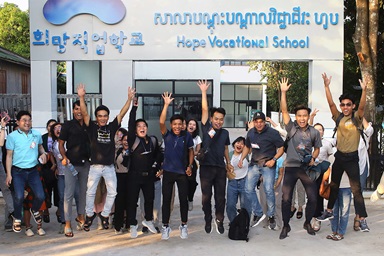After seven years translating for the highest echelons of the U.S. military in his homeland of Afghanistan, Hameed realized he was in grave danger. The Taliban had left a warning tacked to the door of a family business threatening him and his family with assassination.
Given just hours to prepare to leave the country, he, his wife and two small children arrived in Washington in February with little in the way of belongings, money or future plans.
(For his safety, Hameed is only using his given name.) The U.S. government arranged for three month’s housing with Lutheran Family Services, expecting Hameed to be self-sufficient by the end of that time.
A coalition of 10 churches in northern Virginia — eight of them United Methodist — learned about Hameed and his family’s situation and jumped in to help. The Northern Virginia Military Ministry Outreach provided furniture, food, clothing, toys, a television and money. Additional support has included résumé preparation, job search assistance, driving lessons, financial help to pay the rent and other expenses.
Coming to America “was the only choice that we had,” Hameed recently told CBS Evening News reporter Jim Axelrod. “We were the eyes and ears of coalition and American forces. We are left in a lurch and do not know where we’re going to go or what might happen to us tomorrow. … There were times when I felt like I would not survive this situation. I’m a proud man, and I want to work. I want to support my family. But there was no way to find a job.”
The eight United Methodist churches participating are Centreville, Messiah and Sydenstricker in Springfield; Grace and Buckhall in Manassas; Pender and St. George’s in Fairfax; and Christ in Fairfax Station.
How churches got involved
“Representatives from several of those churches went to a seminar on working with returning veterans and found we were doing a similar military ministry independently,” says Bill Shugarts of Christ United Methodist Church, one of the coordinators.
To Help
Christ Church, a United Methodist congregation, is collecting financial support for the Northern Virginia Military Ministry Outreach. If writing a check, please indicate in the memo line that this is for military family ministry. The church is at 8285 Glen Eagles Lane, Fairfax Station, VA, 22039.
You can also donate through the nonprofit No One Left Behind, a partner of the Northern Virginia Military Ministry Outreach, which is collecting donations for multiple interpreters.
In a little more than a year, the organization has done several projects, including a dinner that raised $8,000 for the Wounded Warrior project at Fort Belvoir, and hosting veterans from Fort Bragg in North Carolina and their families who were part of a “Healing Tour” to the Washington area.
But reaching out to help the Hameed family has been especially meaningful to all those involved, Shugarts said.
“I got an e-mail from another church member that said ‘We gotta help this guy.’ That’s how it started. Basically they had dropped him into low-income housing in a high-risk area, a combat zone of another sort… they’d be out on the street now if it weren’t for these churches.”
Recently, the Rev. Monica Reynolds, Christ United Methodist associate pastor, was preaching a sermon on Galatians and asked Shugarts and Hameed to stand up as examples of how people of different faiths can work together. It was a Sunday when Virginia Bishop Young Jin Cho was visiting.
“It sure got the bishop’s attention,” Shugarts said with a chuckle. “He gave Hameed a big hug at the end of the service. It was great!
“It’s by the grace of God that we’re doing this,” Shugarts added. “There’s something really special going on here… with Christians and Muslims helping one another.”
Promises unfilled
Interpreters play a key role in educating foreign troops about the local culture and serve as intelligence sources, not only for information about the Taliban, but also about the Afghan army and police.
This Is Personal
Former Army Capt. Matt Zeller literally owes his life to his Afghani interpreter, Janis Shinwari.
“Janis shot and killed two Taliban fighters who were about to kill me in a firefight,” Zeller said. “I look at every one of these men and women as fellow veterans, as a fellow soldier who served our country in war. They literally wore our uniforms.”
Zeller told his story in the July issue of Guideposts magazine. He’s also gotten involved with the Northern Virginia Military Ministry Outreach and Hameed.
“(Hameed) is a prime example of how the system that was put in place to help has failed,” said Zeller, the president of No One Left Behind, an organization created in 2013 to help translators who have struggled to find footing in the U.S.
“Matt is trying to help several hundred Afghan translators,” said Bill Shugarts of Christ United Methodist Church, “not just one or two guys. He’s really been able to shine a light on this situation, which is a huge major issue militarily, politically… and not just around the Washington area.”
Zeller describes No One Left Behind as an organization of “last resort.”
“We come in when the other organizations have stopped taking care of them, have stopped paying for their housing, when they’ve provided them with horrible furniture and done nothing to get them a job. These people are not being taken care of the way that we promised them. … We’re bringing them here and dropping them into slum housing and not doing anything whatsoever to help them find jobs. How could we not want to do more than give these people a slum and a ‘good luck’ and that’s it?”
Zeller worries that American credibility is on the line.
“We told them if you gave us a year of honorable and faithful service, and that if they found themselves in duress because of that service, so long as they could pass a national security background screening, we would get them here and take care of them and their family. What that means is that they are holding us up to the standards that we held them up to in their country — and they were the greatest friends and hosts that we could have asked for. We're simply not returning the favor, and we need to do better.”
— Neill Caldwell
The army and police sometimes pose as much of a threat to U.S. forces and allies as the insurgents. The interpreters work for years, going out on every patrol with coalition forces. And their work puts their families at risk because the Taliban often target interpreters’ relatives.
They didn’t take the job for the money, since interpreters were lucky if they got paid more than $1,000 a month. Some interpreters took the job because they were promised a U.S. visa after at least 12 months’ service. Most took the job because they believed the Taliban would be defeated and the country rebuilt.
In late May, President Obama announced that the U.S. will withdraw all but about 10,000 troops from Afghanistan by the end of this year, and by the end of 2016, only a small force will be left at the U.S. Embassy in Kabul.
Plenty of loose ends remain. Afghans whose work for the U.S. government puts them in danger with the resurgent Taliban face a situation eerily reminiscent of the end of the Vietnam War.
The 2009 Afghan Special Immigrant Visa program, modeled after a program for Iraqis, was designed to identify people who faced genuine threats and to speed their entry into the U.S. The program was an initial failure, U.S. Secretary of State John F. Kerry admitted in an op-ed written for the Los Angeles Times in June.
“The effort got off to a slow start,” Kerry wrote. “Delays in processing applications and lack of transparency in making decisions created problems. Bluntly stated, the process wasn't keeping up with the demand. ... Some deserving people were simply falling through the cracks.”
The State Department and other federal agencies have made dramatic improvements. Nearly 5,000 Afghans, mainly interpreters and family members, have received visas since Oct. 1, 2013, compared with roughly 1,600 in the previous 12 months.
But the government had already reached the current fiscal year cap of 3,000 new visas, and the special visa program was due to run out in September. On Aug. 1, the U.S. Senate passed legislation to grant an additional 1,000 visas to Afghan interpreters, the Washington Post reported. Earlier in the week, the U.S. House of Representatives had passed similar legislation.
The new legislation expands the number of visas available to 4,000 for fiscal year 2014. As of July, the Washington Post reported that there were around 6,000 applicants still in the pipeline, with about 300 whose cases were close to completion.
“The State Department is working hard to catch up,” U.S. Rep. Earl Blumenauer (D-Ore.), who is among the lawmakers leading an effort to extend and expand the SIV program, told the Washington Post. “While it has made real progress, it is still behind after years of treating the issue as a low priority.”
Hameed is happy that Americans have stepped up to help his family. “I will never, ever forget a call from a man named Keith Saddler, who I never met in my life, telling me, ‘Don’t worry, Hameed, we’re going to help you,’” he recalled.
Saddler, a member at St. George’s United Methodist Church, described the first time he met the family. “We walked in the door of this apartment and there was nothing in there. There was a mattress, not in the best shape, in one of the bedrooms, and that was all they had.”
For Shugarts, a Vietnam veteran, it’s a chance to help atone for past mistakes. “I lived through this before with the drawdown from Vietnam,” he said. “We have good intentions to do the right thing, but we still manage to use other people as disposable.”
Caldwell is editor of the Virginia United Methodist Advocate magazine.
Contact Heather Hahn at (615) 742-5470 or [email protected].
Like what you're reading? Support the ministry of UM News! Your support ensures the latest denominational news, dynamic stories and informative articles will continue to connect our global community. Make a tax-deductible donation at ResourceUMC.org/GiveUMCom.









